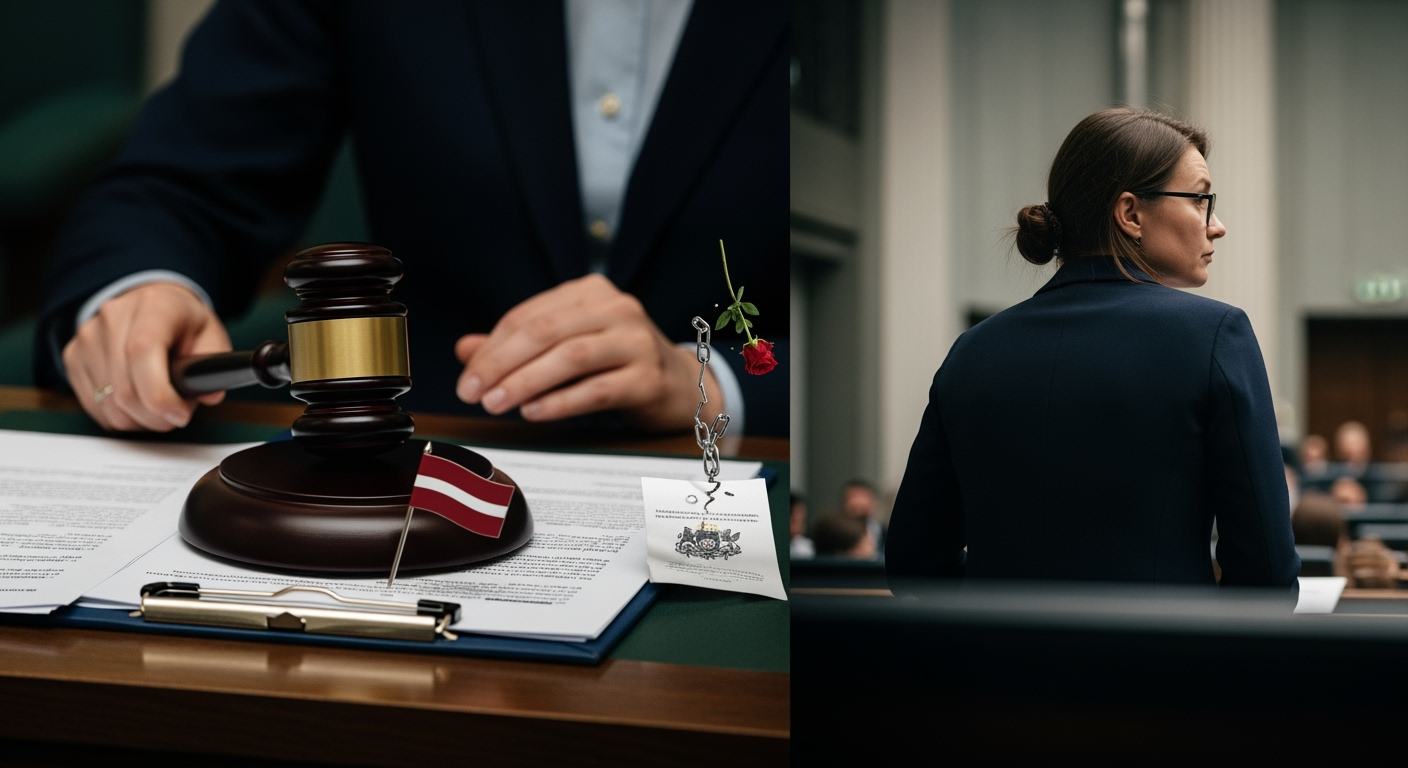Related Articles

Activists Acquitted in Landmark Stonehenge Protest Case

China Launches Groundbreaking Space Mission with Youngest Astronaut and Historic 'Space Mice'





RIGA, Latvia – In a contentious move that has reverberated across Europe, Latvia's parliament, the Saeima, voted on Thursday to withdraw from the Istanbul Convention, a Council of Europe treaty aimed at preventing and combating violence against women and domestic violence. The decision, reached after a marathon 13-hour debate, saw 56 deputies vote in favor of denunciation, 32 against, and two abstaining. Should the withdrawal be finalized by presidential signature, Latvia would become the first European Union member state to exit the convention, a development observers warn could significantly impact the country's international standing and protections for victims of violence.
The vote marks a striking reversal for Latvia, which only ratified the convention on November 30, 2023, with the treaty officially entering into force for the Baltic nation in May 2024. This swift turnaround has ignited fierce debate within Latvia and drawn widespread criticism from international human rights organizations and European bodies. The future of Latvia's commitment to tackling gender-based violence now hinges on President Edgars Rinkēvičs, who has 10 days to either sign the bill into law or send it back to parliament for reconsideration.
The Council of Europe Convention on Preventing and Combating Violence Against Women and Domestic Violence, commonly known as the Istanbul Convention, is a landmark human rights treaty established in 2011 and entered into force in 2014. It represents the first legally binding instrument in Europe to create a comprehensive legal framework for addressing violence against women, recognizing it as a violation of human rights and a form of discrimination. The convention's provisions are built around "four Ps": preventing violence, protecting victims, prosecuting perpetrators, and implementing comprehensive, coordinated policies. This includes obligations for signatory states to invest in awareness campaigns, education, support services like hotlines and shelters, and data collection on gender-related crimes.
The treaty's scope extends to various forms of gender-based violence, including physical, sexual, and psychological abuse, stalking, sexual harassment, forced marriage, and female genital mutilation. It underscores the state's obligation to fully address these issues and to take measures to prevent violence, protect victims, and prosecute offenders. As of 2023, 39 European countries had ratified the convention, with the European Union itself acceding to the treaty in June 2023, making its provisions part of the EU acquis.
The decision to initiate withdrawal from the Istanbul Convention garnered support primarily from a coalition of opposition parties, including the United List, National Alliance, For Stability!, and Latvia First, alongside the Union of Greens and Farmers, a member of the ruling tripartite government. Proponents of withdrawal cited various reasons for their stance, with a central argument revolving around the convention's definition of "gender." Critics claimed the treaty promotes "gender ideology" and encourages "sexual experimentation," which they believe could harm children and conflict with "traditional Latvian values" and national sovereignty.
Many advocating for withdrawal contended that Latvia's existing national laws are sufficient to combat violence against women and that national resources could be more effectively directed towards domestic programs. They argued that the convention's framework was an ideological instrument rather than a practical tool. This perspective often overlooks the convention's role in establishing international standards, facilitating cross-border cooperation, and providing monitoring mechanisms that national laws often lack.
The Saeima's vote was met with strong opposition from various quarters, both domestically and internationally. Prime Minister Evika Siliņa of the New Unity party, whose coalition government came to power in 2023 with a promise to ratify the convention, publicly criticized the withdrawal efforts, stating that it was "cruel" to use the experiences of violence survivors for "political battles." Her party, along with the Progressives, voted against the withdrawal.
Outside parliament, thousands of Latvians took to the streets of Riga to protest the proposed withdrawal, with an estimated 5,000 people demonstrating on the eve of the final vote. A public initiative against the withdrawal also gathered over 20,000 signatures. Women's rights organizations, such as the Marta Centre, highlighted the concrete benefits of the convention since its entry into force, emphasizing its role in saving lives and strengthening protections.
Internationally, the decision drew swift condemnation. The Special Representative of the OSCE Chairperson-in-Office on Gender, Saara-Sofia Sirén, expressed deep concern, stating that the safety of women and girls should not be used as a tool in political games. Amnesty International deemed the vote an "appalling and dangerous decision," warning it would be a "devastating blow" to the protection of women and girls in Latvia and urged President Rinkēvičs to veto the bill. The Council of Europe has consistently refuted claims that the convention promotes "gender theories," clarifying that it does not establish new norms on gender identity or sexual orientation. Moreover, the withdrawal contradicts Latvia's commitments as an EU member, especially given the EU's own ratification of the convention and the adoption of a directive on combating violence against women in May 2024, which Latvia is legally required to transpose into national law by June 2027.
The onus is now on President Edgars Rinkēvičs to decide the fate of Latvia's withdrawal. While he has expressed reservations about the move, he has also hinted that he might not override a parliamentary decision. His decision within the next 10 days will be a pivotal moment for Latvia's human rights record and its standing on the international stage.
Should the withdrawal proceed, Latvia would join Turkey as the only other nation to leave the Istanbul Convention. Turkey's withdrawal in 2021 was widely criticized, with reports indicating a subsequent increase in femicides. Critics warn that Latvia's exit could similarly embolden anti-human rights movements, damage its reputation as a democratic nation committed to human rights, and potentially lead to a less robust framework for protecting victims of violence. The vote has also exposed cracks within Latvia's governing coalition, raising questions about political stability ahead of the next parliamentary elections in fall 2026. The coming days will determine whether Latvia reaffirms its commitment to international standards on violence prevention or embarks on a path that could isolate it from its European partners and leave vulnerable populations with diminished protections.